The most common pathology of the genitourinary system in men is an inflammatory disease of the prostate. According to statistics, prostatitis is diagnosed in every 10 patients of mature age. Without proper treatment, the disease progresses rapidly, leads to serious complications and affects the sexual life of a man.
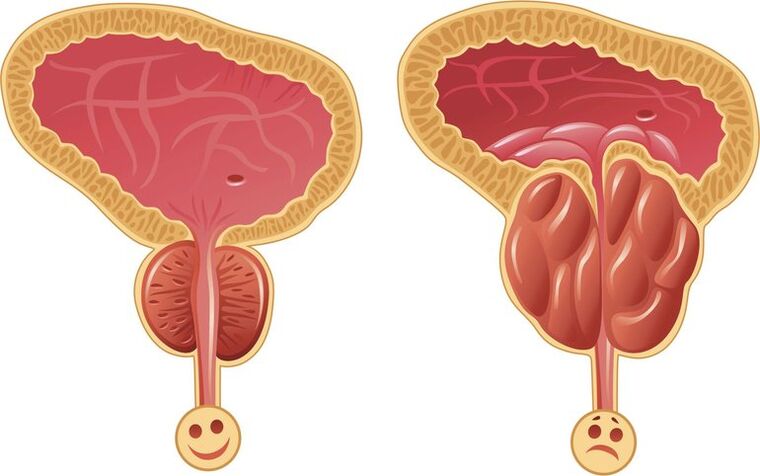
disease symptoms
Any disease is easier to treat when diagnosed at an early stage. Prostatitis occurs both in acute and complicated form - chronic, which occurs in the case of neglected inflammation of the prostate. The symptoms and treatment of the disease differ and depend on its stage and type. In the acute course of pathology, a man experiences:
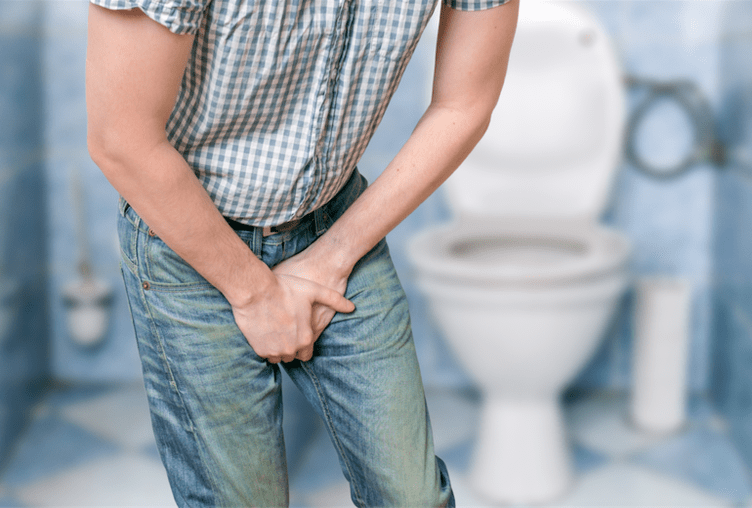
- Difficulty urinating. One of the first signs is problems with the passage of urine due to narrowing of the ureter. In the early stages, the prostate begins to grow in size and slightly compresses the ducts.
- Pain in the lower abdomen, which is most often disturbed after physical exertion or at the end of the day. The pain in sensation and intensity is different: they can be pulling, cutting, aching. They then spread through the scrotum and penis, and during defecation they pass into the rectum. The disease provokes the appearance of constipation, which only increases the inflammatory process in the prostate gland.
- Frequent urination. A man who has not previously woken up to empty his bladder may go to the bathroom 1 or 2 times a night early in the illness. With the transition of prostatitis to another form, the urge to urinate decreases. It gives the impression of overcrowding of the bladder and, after going to the toilet, incomplete emptying.
- Visual change in urine. Already in the early stages of the development of pathology in the urine, impurities of pus or blood can be detected.
- The appearance of sexual dysfunction. Men experience erection problems and severe pain during ejaculation.
- Prolonged increase in body temperature in the region of 39 degrees, which is accompanied by chills, weakness and body aches.
Most of the symptoms of the disease are clearly manifested. The task of men is to carefully monitor the state of their body and its changes, not to miss the first signs and not to allow the pathology to develop into a chronic stage.
The first manifestations of inflammation of the prostate gland in the representatives of the stronger sex in a neglected form are almost the same as in the acute phase of the disease. But they are accompanied by symptoms such as:
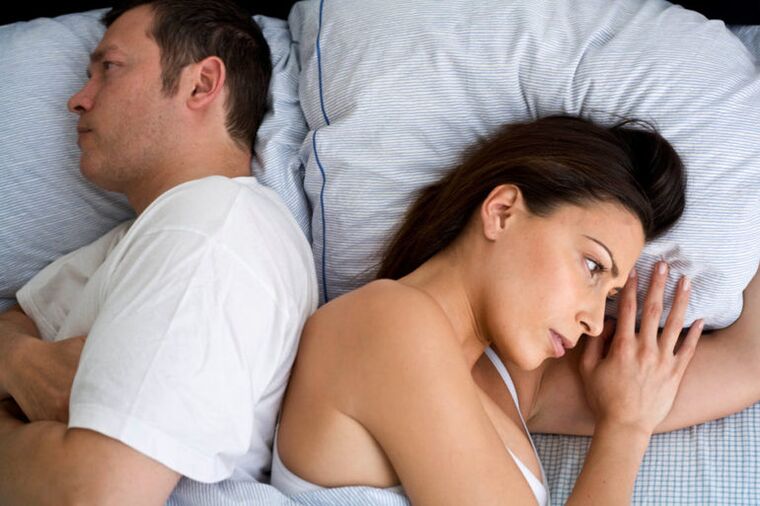
- Decreased libido, disappearance of erection during intercourse, detection of blood in semen.
- Frequent desire to urinate, fullness in the bladder, white scales in the urine. During an exacerbation, a man may be completely deprived of the ability to empty his bladder, since the swollen prostate blocks the passage of urine in the urethra.
- Depression, insomnia, or sleepiness. Men suffering from such a disease as prostatitis often experience outbursts of anger or aggression associated with a psycho-emotional disorder.
In order to avoid mistakes in making the correct diagnosis, it makes sense to be examined by several doctors and in different institutions. Symptoms and treatment of prostatitis, like any other disease of the genitourinary system, is not a topic that should be delayed or saved in health.
Reasons for development
It is almost impossible to determine the main cause of the pathology. At the same time, there are not so few provoking factors, each of them is very serious, especially considering the male habit of neglecting health. Main reasons:

- The formation of congestion in the pelvic region. They are characterized by sluggish blood circulation, in which the nutrition of the tissues deteriorates, edema occurs, and the functioning of the capillaries is disrupted.
- Hypothermia. Having frozen even once, the men themselves provoke the development of inflammation of the prostate gland.
- A sedentary lifestyle, in which the representatives of the stronger sex sit for hours in one position. No less damaging is work associated with vibrations (tractors, drivers). With constant shaking, the perineum is injured, and the organs of the pelvic region are weakened, which creates additional conditions for the onset of inflammation.
- Transferred venereal diseases. Sexually transmitted infections cannot bypass the prostate. Even after treatment, immunity decreases and the prostate becomes vulnerable.
- stool retention. Constipation creates greater stress by emptying the rectum, traumatizing the prostate. In addition, stagnation is intensified and the reverse absorption of toxins occurs, including in the nearby prostate gland.
- Extremes in intimate life. Deficiency and excess of sex equally negatively affect reproductive health. With excessive activity, the prostate wears out, and withdrawal increases stagnation in it.
- Interruption of sexual intercourse. As a contraceptive method, it is recognized to be ineffective and detrimental to men's health. Attempts to control a physiological process that is already running are very harmful.
- Abuse of alcoholic beverages, malnutrition. These two factors lead to inflammation of the prostate and the appearance of malignant neoplasms.
- Urological diseases. Due to the close anatomical connection with the reproductive system, inflammatory processes in the urinary system can penetrate a little lower and affect the prostate.
Identifying the causes that contributed to the development of inflammation, the urologist individually selects treatment, excluding adverse factors.
treatment methods
Therapy of inflammation of the prostate gland should be comprehensive. After diagnosing the disease, the doctor, as a rule, prescribes an individual treatment regimen. To achieve a positive effect, the patient needs at least 4-6 months. Today, many different methods are used for treatment, including drug therapy, the use of physical therapy procedures, and massage. In official medicine, these methods are recognized as the most effective and safe for the health of the stronger sex.

Qualified psychotherapy is considered an equally important measure, since the constant painful sensations and problems that have arisen in intimate life negatively affect not only the general well-being of the patient, but also the psychological state of her.
medical therapy
Surgical treatment is indicated in cases where medical measures have not worked or the prostate blocks urine output. Surgery can cause infertility, so it is not prescribed for young men.
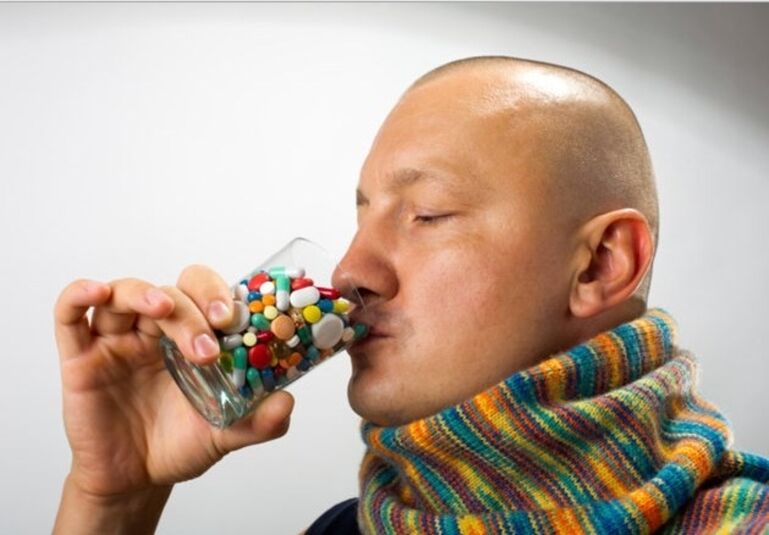
Antibacterial therapy is carried out with infectious prostatitis. When the cause of the pathology is not bacteria or viruses, antibiotic treatment is considered meaningless. To relax the muscles of the prostate, improve urine flow and relieve pain in the perineal region, alpha-blockers are used.
Muscle relaxants will help reduce pain and eliminate muscle tension in the pelvic region. Seriously ill patients are prescribed droppers with diuretics, which contribute to the abundant release of urine and prevent further intoxication of the body.
The course of treatment must be completed to the end, even if the symptoms of the disease have completely disappeared. Signs of prostatitis often disappear at the beginning of antibiotic therapy, but when treatment is stopped, they become chronic.
Nonbacterial prostatitis requires a different treatment regimen. It consists of taking analgesics and antipyretics.
Simultaneously with the main treatment, the urologist prescribes supportive therapy, which includes bed rest, drinking plenty of water and taking sitz baths. Patients should follow a diet that limits alcohol, caffeine, fatty and spicy foods.
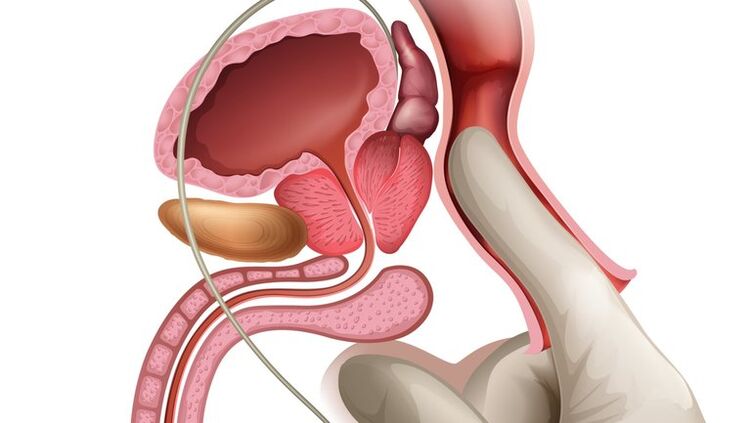
For chronic inflammation of the prostate gland, the most effective remedy is regular prostate massage, which reduces the likelihood of re-inflammation. The course of treatment consists of 10 sessions. A contraindication to the procedures is rectal cancer and exacerbation of prostatitis.
Physiotherapy is used not only for treatment, but also for preventive purposes. It improves blood circulation, increases muscle tone, accelerates tissue regeneration and increases cell permeability. It is forbidden to use this method for high blood pressure, temperature, epilepsy, cancer, urolithiasis, anemia, diseases of the kidneys and cardiovascular system.
The use of rectal suppositories reduces the negative impact on the functioning of the internal organs. Suppositories may contain antibiotics, herbs, antispasmodics. They remove puffiness, relieve inflammation and restore urination.
folk ways
Pathology therapy at home with alternative medicine recipes is effective only at an early stage. There are many ways to eliminate the main symptoms of inflammation:
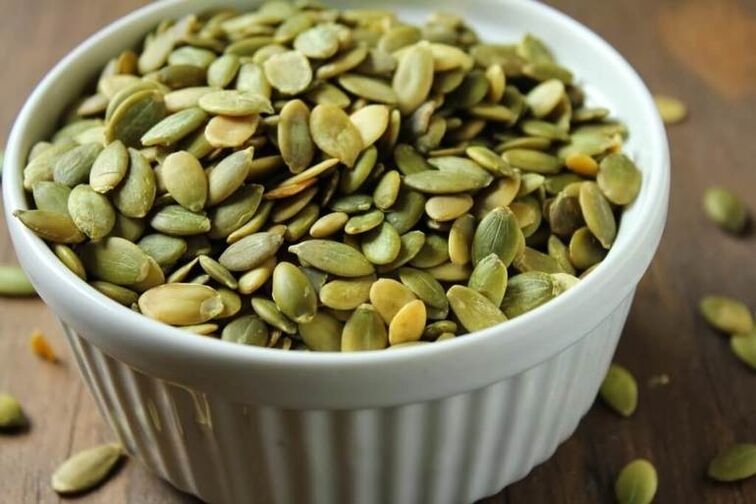
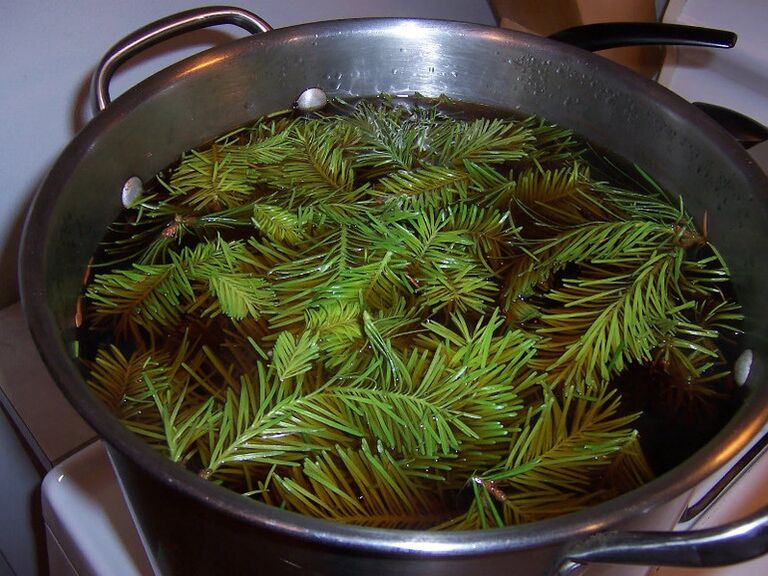
- Fried pumpkin seeds (500 g) are twisted in a meat grinder, then honey (200 g) is added and mixed well. From the mixture of pumpkin and honey, balls no larger than a walnut are made. They dissolve half an hour before each meal, 1 piece for 2-3 minutes. The product is stored in the refrigerator. Pumpkin seeds contain a large amount of zinc, which is necessary to maintain the normal function of the genitourinary system.
- Crushed and dried aspen bark (100 g) is placed in a half-liter jar and poured with vodka (200 g). The container is tightly closed, it is allowed to infuse in a dark place. After two weeks, the tincture is filtered and consumed 20 drops, diluted in a quarter glass of water, 3 times a day before meals.
- Honey (1 teaspoon), egg (1 teaspoon) are mixed with rye flour (3 tablespoons), thin suppositories are made from the dough, the diameter of which should not be more than 1 cm Candles are stored in the refrigerator . In the morning and at night they are introduced into the anus after emptying the rectum. The course of treatment is about 4 weeks, then they take a break and repeat the therapy.
- Small onions (3 pieces) are rubbed on a fine grater, poured with boiling water (3 tablespoons) and insisted for a day. The decoction is taken in 50 ml every hour.
- Pine branches (200 g) together with boiled water (2 l) are simmered over low heat for 2-3 hours. After boiling, the decoction becomes an extract. Prepare such a concentrate immediately before taking a warm bath. The water level should not be higher than half the chest. The pelvic area is rubbed with the drug for 15 minutes until redness appears. Therapy is carried out daily for 2 weeks. Baths have an antimicrobial effect, anesthetize and improve urination.
No matter how good the effect of folk remedies is, it is difficult for them to compete with the achievements of pharmacology. The most correct and effective solution will be an integrated approach to the treatment of prostatitis.






























